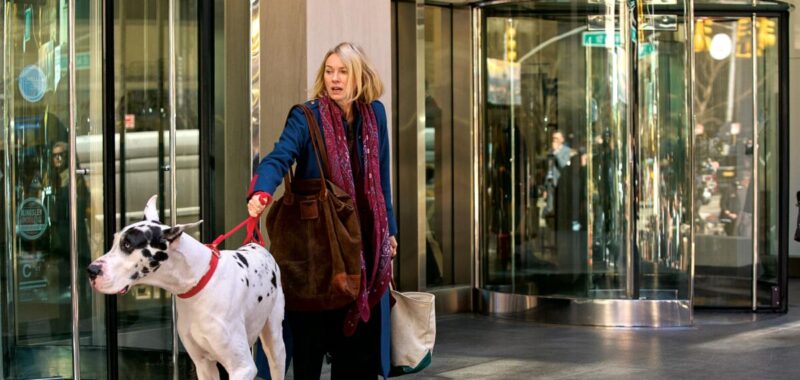Better than any virtual character a crack visual effects team could conjure, the long-faced gentle giant of a dog that gives “The Friend” its abiding soulfulness — a black-splotched Great Dane with the drooping eyes of a silent-era clown, credited as Bing — is also, it turns out, among the best co-stars a superlative onscreen sufferer like Naomi Watts could have in her long, storied career.
Together, these beautifully mismatched but generous screen sharers help lift David Siegel and Scott McGehee’s mild, casually elegant interpretation of Sigrid Nunez’s National Book Award-winning 2018 novel about grief to a rarefied emotional place. Amid a handsomely shot New York of towering skylines, busy thoroughfares and cramped apartments, “The Friend” strips the pet-movie genre from the easy appeal of mawkishness, bringing it closer to what an ongoing dialogue between lonely species stumbling into connection actually feels like.
Watts, a veteran of onscreen interiority, plays Iris, a stagnated writer and professor unable to make sense of the recent suicide of her mentor and best friend Walter, played by Bill Murray in some dryly funny opening scenes that in effect give us a chance to miss him too.
A genial misanthrope and serial womanizer who considers it a personal point of pride that after sleeping once with Iris they remained close, Walter nevertheless leaves behind many mourners: admirers, colleagues, a grown daughter (Sarah Pidgeon) from an affair, a couple of exes (Carla Gugino, Constance Wu) and a third and final wife (Noma Dumezweni), who informs Iris that it was Walter’s wish that she take care of his pony-size companion, Apollo.
The left-field bequest — as if tending to Walter’s legacy with an overdue book of his correspondence wasn’t enough — is, to Iris, a mystery on top of a conundrum. She suddenly finds her rent-controlled shoebox of an apartment taken over by a bed-hogging, furniture-destroying roommate whose very presence might get her evicted, if the unsmiling reminders from an otherwise friendly building super (Felix Solis) are any indication.
But in her nerve-racked attempt to re-home Apollo while seeing to his needs, Iris is forced to reckon with what this 100-plus pounds of solemnity really is: an embodiment of Walter, sure, but also a creature just as grieving, blocked and lost as she is. Does one just push that away?
Fans of Nunez’s tartly discursive yet flowing novel will likely miss the snap of its critical observations on literary mind-sets and whatnot. Movies struggle to capture what’s shaggy and bitter about writers without falling into the trap of one-liners. But while the author-world stuff falls into a kind of bland narrative dressing — even with the sturdy contributions of the supporting cast — Siegel and McGehee know the heart of their movie is in what Iris and Apollo create. They’re an odd couple feeling each other out for a way back into life.
Which is where the evergreen allure of Watts’ mastery with sorrow comes in, her skills just as assured when in solo mode as when against others (including, yes, the gargantuan CGI ape of “King Kong”). But with Bing, whom the filmmakers treat as a genuine co-star worthy of close-ups, contemplation and authentic dog behavior, Watts finds another rich vein of emotion to dramatize with delicacy, humor and intelligent vulnerability. Her Iris lets us see why, in our darkest times, the poles of forced solitude and togetherness can feel so unsatisfying, yet the right kind of aloneness can be the stuff of real healing.

